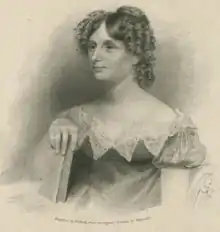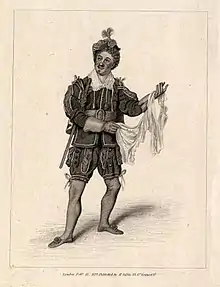Sarah West (actress)
Sarah West (22 March 1790 – 30 December 1876) was a British actress.
Sarah West | |
|---|---|
 | |
| Born | Sarah Cooke 22 March 1790 Bath, England |
| Died | 30 December 1876 (aged 86) Glasgow, Scotland |
| Nationality | British |
| Occupation | Actress |
Life
She was born Sarah Cooke in Bath, Somerset on 22 March 1790, daughter of Mr. Cooke of Bath. Influenced by her cousin Harriet Waylett, she appeared at the Theatre Royal, Bath on 22 May 1810 for the benefit of her uncle, an actor, playing Miss Hardcastle in She Stoops to Conquer, and in 1811, at the same house, played Emily Tempest in The Wheel of Fortune.[1]
In the summer of 1812, she played at Cheltenham and Gloucester. Recommended by Mr. and Mrs. Charles Kemble, she made, as Miss Cooke, her first appearance at Covent Garden on 28 September 1812 as Desdemona.[2] On 10 November 1814, she played Juliet at Edinburgh. She was followed there by William West (see below), and in March 1815 they married.[1]
On 30 September 1815, as "Mrs. W. West (late Miss Cooke) from Edinburgh", she reappeared in Bath.[3][1] On 17 September 1818, she made as Desdemona her first appearance at Drury Lane Theatre. Leading business, principally tragic, was now assigned her.[4][5] After the death of Alexander Rae, the Edgar to her Cordelia and the Lear of Edmund Kean, she spoke an address for the benefit of his family on 31 October 1820. It was thought an example of her dramatic intelligence that she avoided the last line, which was to be "pardon Cordelia's tears, they're shed for Rae". Conscious of its bathos, she substituted for it, with great effect, the line, "Pardon Cordelia's tears. Poor Tom's a cold."[1]
West was at Drury Lane the first Beaumelle in an alteration of The Fatal Dowry on 5 January 1824.[6] When the record in John Genest's history stops, information concerning her becomes scanty. It appears she was in a relationship with Leman Rede by 1830, a newspaper report on his death in 1847 states that they 'were united in 1830 and he left a ten year old son by that lady'.[7] In 1835 she was at Covent Garden under David Osbaldiston, but played mainly secondary parts, and she then lapsed into performing at lesser theatres. Her last London engagement was at the Marylebone Theatre in about 1847.[1]
Sarah West died at Glasgow on 30 December 1876 at the house of her great-nephew, Henry Courte Cooke, and was buried at Sighthill cemetery on 2 January 1877.[1][8]
Assessment
Sarah West in her time was classed next to Elizabeth O'Neill, as a capable actress. William Oxberry's Dramatic Biography called her one of the most beautiful women on the stage.[1]
Family

Her husband, William West (1796?–1888), comedian and musical composer, lived to be called "The Father of the Stage". Through jealousy, Sarah West separated early from William, by whom she had two children, and never rejoined him.[1]
West's father was connected with Drury Lane Theatre. After studying music under Thomas Welsh and subsequently under Charles Edward Horn, he appeared at the Haymarket Theatre in 1805 as Tom Thumb. He then played parts at Drury Lane such as Juba in The Prize and Boy in Children in the Wood. In 1814 he followed Sarah to Edinburgh, and next year married her, in the teeth of much competition.[1]
West's first appearance in Edinburgh was on 10 November 1814 as Don Carlos in The Duenna. After playing in Bath and Bristol he appeared in London at the East London Theatre, and on 9 May 1822 played, at Drury Lane, Lord Ogleby in the Clandestine Marriage. He also acted at the Olympic and other theatres. He gave in 1842 an entertainment based on the Shakespearean clown.[1]
West died late in January or early in February 1888. He wrote some popular songs: When Love was fresh from her Cradle-bed, Alice of Fyfe, and Love and the Sensitive Plant. His glees included The Ocean King, Up Rosalie, Oh, Bold Robin Hood, and The Haaf Fishers. Maid Marian was a sonata, and he also wrote An Ancient English Morris Dance with Variations.[1]
References
- Knight 1899.
- On 3 October, she played Lady Percy in ‘Henry IV,’ and on the 16th had a part in an unprinted play called ‘Schniederkins.’ Miranda in Dryden's ‘Tempest,’ Julia in the ‘Rivals,’ and Angelica, an original part in Jameson's ‘Students of Salamanca,’ on 23 January 1813 followed, but attracted little attention. Next season she was Fanny Sterling in the ‘Clandestine Marriage,’ Charmian in ‘Antony and Cleopatra,’ was the first Georgiana in ‘Folly as it Flies’ on 27 Nov., and the first Eliza Arundel in Pocock's ‘For England Ho!’ on 15 December.
- Playing Statira in ‘Alexander the Great,’ Violante in the ‘Wonder,’ Queen Mary in ‘Albion Queens,’ Julia in ‘Italian Lover,’ Cherry in the ‘Beaux' Stratagem,’ Dame Kitely in ‘Every Man in his Humour,’ Lydia Languish to her husband's Fag, and Eugenia in the ‘Duke of Milan.’ Here she remained during the two following seasons, playing Imogene in ‘Bertram,’ Mrs. Belmour in ‘Is he Jealous,’ Aspasia in ‘Tamerlane,’ Calista in the ‘Fair Penitent,’ Leonora in the ‘Revenge’ to Kean's Zanga, Millwood in ‘George Barnwell,’ Ellen in ‘Lady of the Lake,’ Octavia in ‘All for Love,’ Elvira in ‘Pizarro,’ Tilburina in the ‘Critic,’ Helen McGregor in ‘Rob Roy,’ Alicia in ‘Jane Shore,’ and other parts.
- She was seen during the first season as Belvidera in ‘Venice Preserved,’ Lady Townley, Lady Macbeth, Hermione, Mrs. Beverley, Jane Shore, Julia in the ‘Rivals,’ Mrs. Haller, and in very many original rôles, among which may be named Tarquinia in Howard Payne's ‘Brutus’ on 3 December, Clare St. Clare in ‘Flodden Field’ (‘Marmion’) on 31 Dec., Imma in Soane's ‘Dwarf of Naples’ on 13 March 1819, Angelina in Buck's ‘Italians’ on 3 April, Rosa in Milner's ‘Jew of Lubeck’ on 11 May, and Claudina in Twiss's ‘Carib Chief’ on 13 May.
- Among parts played in subsequent seasons were Lady Amaranth in ‘Wild Oats,’ Lady Anne in ‘Richard III,’ Cordelia, Adelgitha in a piece so named, Cora in ‘Pizarro,’ Portia in ‘Julius Cæsar’ and in the ‘Merchant of Venice,’ Ella Rosenberg, Queen Katharine in ‘Henry VIII,’ Zorayda in the ‘Roman Actor,’ Yarico, Juliet, Perdita, Alcmena in ‘Amphitryon,’ Zaphira in ‘Barbarossa,’ and the Queen in ‘Hamlet.’ Most important among her many original parts were Rebecca in the ‘Hebrew’ (Soane's adaptation of ‘Ivanhoe’) on 2 March 1820, Virginia in ‘Virginius’ (put up at Drury Lane to rival Knowles's play at Covent Garden) on 29 May, Mary Queen of Scots in Hamilton's ‘David Rizzio’ on 12 June, Pocahontas in the piece so named on 15 Dec., Julia in ‘Montalto’ on 8 Jan. 1821, Angiolina in ‘Marino Faliero’ on 25 April, and Norna in the ‘Pirate’ on 15 Jan. 1822. She had hitherto constantly supported Kean. On 13 Oct. 1823 she played Virginia in Knowles's tragedy to Macready's Virginius, and on 18 Nov. was the first Licinia in Knowles's ‘Licinius.’ She was the first Amy Robsart in a version of ‘Kenilworth,’ 5 January 1824. On 13 October, at the Haymarket she played Sophia in the ‘Road to Ruin.’
- Also Lorina in Soane's ‘Massaniello’ on 17 February, Berengaria in ‘Knights of the Cross’ (‘The Talisman’) on 29 May 1826, Emerance in Grattan's Ben Nazir, the Saracen on 21 May 1827, Julia in the ‘Gambler's Fate’ (adapted from the French by Thompson) on 15 October, and Maria de Padilla in Lord Porchester's ‘Don Pedro’ on 10 March 1828.
- "Death of Leman Rede". Morning Advertiser. 5 April 1847. p. 3.
- Gilliland, J. "West, Sarah". Oxford Dictionary of National Biography (online ed.). Oxford University Press. doi:10.1093/ref:odnb/29075. (Subscription or UK public library membership required.)
- Attribution
![]() This article incorporates text from a publication now in the public domain: Knight, John Joseph (1899). "West, Mrs.". In Lee, Sidney (ed.). Dictionary of National Biography. Vol. 60. London: Smith, Elder & Co.
This article incorporates text from a publication now in the public domain: Knight, John Joseph (1899). "West, Mrs.". In Lee, Sidney (ed.). Dictionary of National Biography. Vol. 60. London: Smith, Elder & Co.